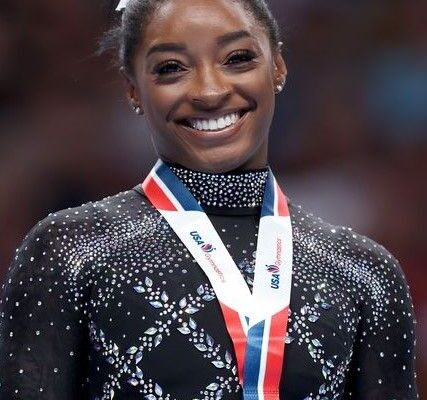A heated online debate over the inclusion of transgender athletes in women’s sports has drawn in two prominent figures: Olympic gymnastics champion Simone Biles and former collegiate swimmer turned conservative activist Riley Gaines. The sharp exchange, played out across social media, has intensified the national conversation on fairness, inclusion, and the future of female athletics.
The public conflict ignited after Gaines criticized a Minnesota high school softball team, alluding to the presence of a transgender player on the roster. In a post on X, Gaines commented, “Comments off lol. To be expected when your star player is a boy.” The remark quickly drew a sharp rebuke from Biles, who responded directly on the platform.

Biles condemned Gaines’ comment, labeling her “a sore loser” and accusing her of bullying transgender athletes. “all of this campaigning because you lost a race,” Biles wrote, referencing Gaines’ public advocacy that began after she tied with transgender swimmer Lia Thomas at the 2022 NCAA Championships. Biles championed a more inclusive approach, stating, “you should be uplifting the trans community,” and suggested focusing on creating fair competitive environments rather than targeting individual athletes.
The gymnast’s forceful entry into the debate garnered a mixed reaction. While many praised her for her courage and for standing up for transgender inclusion, others criticized her tone and accused her of abandoning her position as a role model for all female athletes.
Gaines swiftly responded to Biles, defending her stance as a necessary fight for the integrity of women’s sports. She accused Biles of hypocrisy and body-shaming in a subsequent post. Gaines has consistently argued that her campaign is about ensuring fair competition for biological females, a position she has passionately advocated for since her experience competing against Thomas.
The high-profile dispute attracted commentary from other notable sports figures, largely in support of Gaines. Former NFL kicker Jay Feely suggested Biles’ own decorated career would have been different if she had competed against transgender athletes. Similarly, former NASCAR driver Danica Patrick weighed in, describing the inclusion of transgender women in female sports as “irrational.”

This clash between Biles and Gaines has come to symbolize the deeply entrenched and often polarizing national divide on the issue of gender identity in sports. Their exchange highlights the competing values of inclusion and fair play, with both athletes now standing as powerful, albeit opposing, voices in a debate that continues to unfold across the country.


